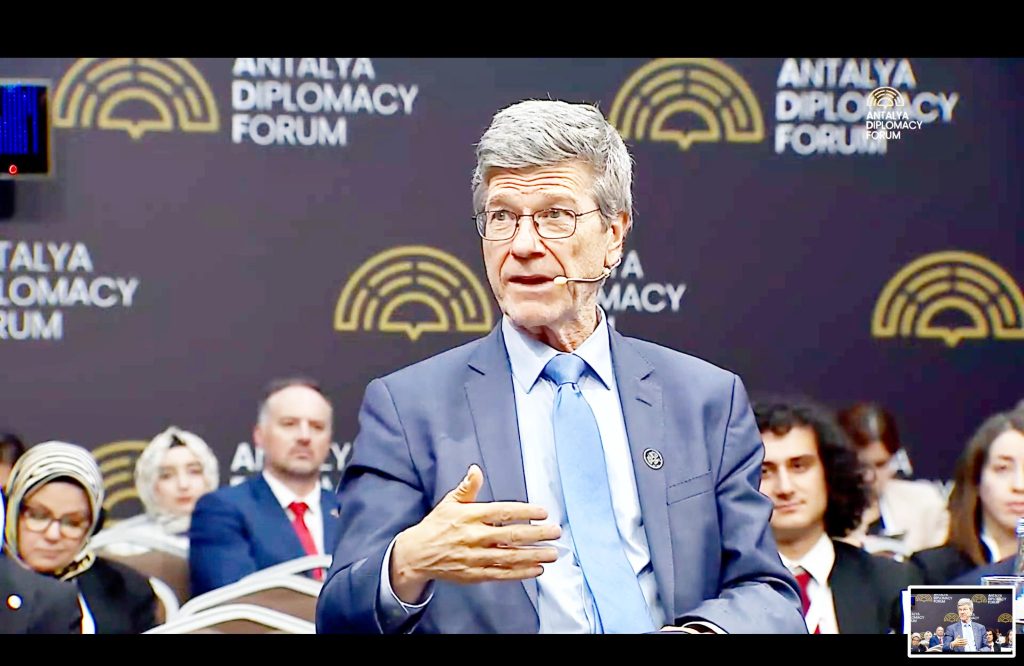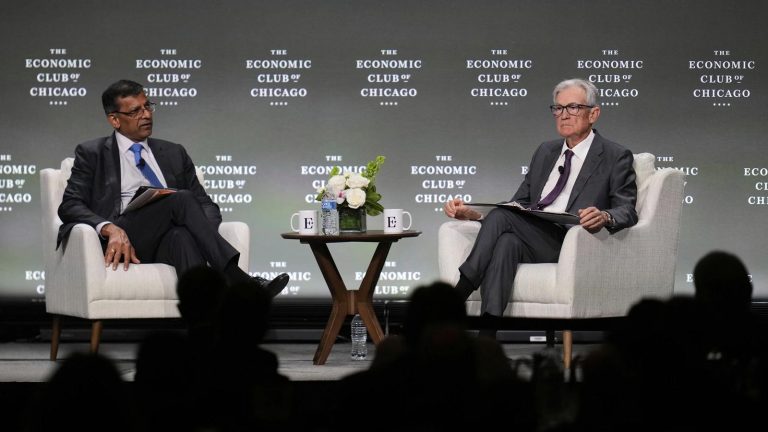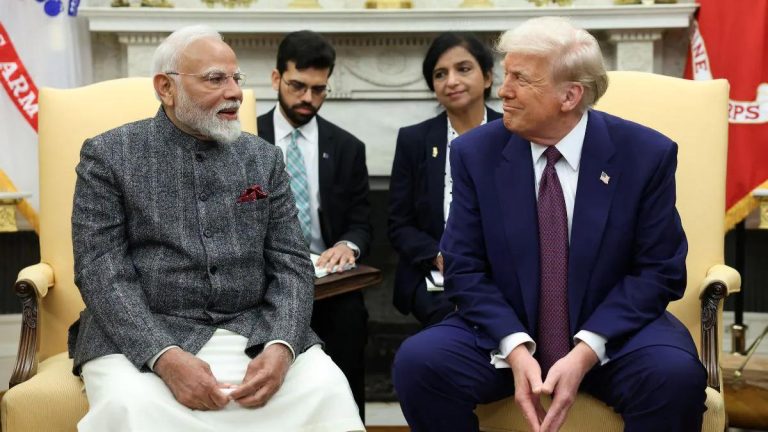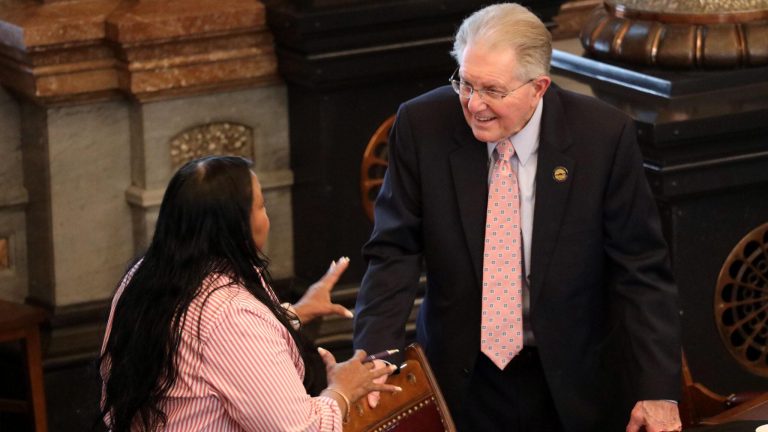
Jeffrey Sachs Warns: Trump’s Tariff War Risks Global Collapse | Image Source: neweralive.na
WASHINGTON, D.C., April 11, 2025 – As trade tensions with China and other countries intensify, one of the world’s most respected economists, Jeffrey D. Sachs, the alarm is sounding. Sachs cautioned against the fact that the renewed tariff policies of former President Donald Trump – particularly the reciprocal tariffs on Chinese imports, which now reach 125% – are not only economically bad, but potentially catastrophic. Speaking with Firstpost and CNBC-TV18, Sachs described development as a ”road to the ruin of the global economy,” linking current developments with historical precedents such as the terms of Smoot-Hawley 1930 and the 2008 financial crisis.
At the heart of Sachs’ argument is a deep concern for what he considers to be the short, or absolute ignorance, vision of the protectionist economy. It ignores the idea that these tariffs could produce long-term benefits for the United States, while cautioning that they lead to a disruption of global supply chains, a $10 billion erosion of market capitalization and a growing disillusionment among US trading partners, many of which are already turning to China. According to Sachs, this is not just a matter of bilateral tension between Washington and Beijing; It is an existential test of multilateralism, global diplomacy and economic cooperation in an increasingly fragmented world.
Why does Jeffrey Sachs compare Trump’s pricing strategy to a global ball?
According to Sachs, the most alarming aspect of the current US trade strategy is its unpredictability. As he said at the Antalya Diplomacy Forum in Turkey, the US trade deficit, often cited by Trump as a justification for tariffs, is largely the result of domestic mismanagement rather than foreign exploitation. ”If a massive credit card account is launched, it’s not the store’s fault,” Sachs said, drawing a strong analogy that resonates with its audience.
According to Sachs, the U.S. government is about $2 billion higher each year than its earnings. Instead of implementing responsible fiscal policy or reducing budget deficits, Washington scapegoats its trading partners – a Sachs approach considers both misleading and dangerous. The problem, he said, lies not in free trade itself, but in the way American leaders interpret economic interdependence. This story echoes the often repeated analogy of Sachs in the United States acting as a consumer by accusing traders of personal excess.
Beyond the deficit argument, Sachs stressed that economic nationalism – far from protecting employment – actually undermines the very basis of world trade. The announcement of reciprocal rates led to an impressive $10 billion drop in global market capitalization in just two days. As Sachs has clearly said, “if you eliminate so much market value at night, you are on the wrong track”
How could these tariffs affect allies and developing countries?
Perhaps the most disturbing thing is collateral damage. Sachs criticized the imposition of tariffs on smaller countries such as Lesotho and Namibia, arguing that these measures are fundamentally unfair and economically harmful. Lesotho, which sent more than 75% of its exports to the United States - mainly textiles – was reached with a punitive tariff of 50%, the highest of all nations. Namibia, which participates in the African Growth and Opportunity Act (AGOA), currently faces 21 per cent of its assets, which could endanger thousands of jobs in sectors such as beef, fish and precious stones.
According to this, Sachs called Trump’s logical baffle. He liked the situation to believe that every transaction had to be balanced: “Trump believes that if Lesotho sells us more than we buy, they must deceive us. It’s crazy, he says. Such a thought, Sachs says, ignores the basic economic principles of comparative advantage and mutual advantage in trade. It also introduces instability into global supply chains that have taken decades to build, with consequences that go far beyond Washington or Wall Street.
Is there a broader geopolitical change?
Yes, Sachs believes Trump’s antagonistic trade position is driving many long-term US allies to reconsider their alignment. Trump alienates the rest of the world, warns Sachs. As a result of sanctions imposed on Canada over disputes with NATO allies and punitive tariffs imposed on developing countries, US leaders erode global confidence. In particular, Sachs sees a growing opportunity for China to penetrate the vacuum left by US unilateralism, including the BRICS alliance and alternative payment systems that bypass the US dollar.
Beijing has already reduced its reserves in dollars, a clear sign of its intention to dissociate financially from the American economy. Sachs predicts that this change will only accelerate if the United States continues to arm the dollar for geopolitical purposes. “The world will need other means to make payments,” he warned. This could lead to a readjustment of the global trading architecture, with China, India and other emerging powers building stronger economic and diplomatic ties, possibly to the detriment of the United States.
What about India’s role in the equation between the United States and China?
Interestingly, Sachs views India as a crucial oscillation state in the emerging world order. It supports the idea of India and China to set aside border disputes for strategic cooperation. “India’s strength and success will be good for China,” he said, especially in the fight against Western protectionism. He also expressed scepticism about the feasibility of a bilateral trade agreement between the United States and India under current conditions, noting that the persistence of tariff uncertainty makes long-term commitments difficult.
When asked whether the United States used India as a pawn against China, Sachs did not look at the words. He said Washington wants to use New Delhi “to beat China”, an approach that ignores the complex dynamics of Asia and the risks that undermine regional stability. On the other hand, Sachs advocates a multipolar world where large economies work together to defend multilateral institutions and promote sustainable development.
What are the implications for global institutions such as the WTO or the UN?
According to Sachs, Trump’s approach is hostile not only to trading partners, but also to multilateral institutions that have supported global cooperation for decades. From the World Health Organization to the World Trade Organization and United Nations-affiliated organizations, funding cuts and the dismantling of policies under Trump are aimed at dismantling international frameworks.
However, Sachs remains optimistic. “These institutions will survive,” he said, “because the rest of the world needs them. He believes that, while American influence is diminishing within these organizations, they will continue to function and evolve, perhaps even strengthen without American domination. He sees this as a necessary rebalancing in a world that is no longer centered on a superpower.
How are these policies aligned with sustainable development goals?
Not at all, according to Sachs. The teacher has long advocated sustainable development, predictable policies and global cooperation. Trump’s energy and trade policies – from the exit of the Paris Climate Agreement to the dismantling of the Sustainable Development Goals (SDGs) framework – directly undermine these efforts. “Everything Trump does in trade is the same for sustainable development,” he said.
Moreover, Sachs sees a disturbing intersection between economic aggression and environmental indifference. He argued that unilateral sanctions, the reversal of climate commitments and mining agreements, such as those proposed in Gaza and Ukraine, set out a governance model that prioritized short-term achievements in global long-term well-being. It is a model that, he warned, could eventually isolate the United States from the same international community as before.
Can the damage be cancelled?
Sachs remains optimistic but realistic. The elimination of damage will take more than one political axis; It will require a fundamental change in mentality. He described Trump’s philosophy as “spiritist and shortened”, a philosophy that alienated allies, strengthened opponents and disrupted a fragile global economy. The way forward, he said, was to return to diplomacy, restore confidence and reaffirm the commitment of the United States and the United States to global cooperation.
Ultimately, Sachs believes that the international community must come together to defend the rule of law and preserve the institutions that have fostered peace and prosperity since the Second World War. “It is time,” he concluded, “that the rest of the world joins in protecting the rule of international law. »
Your comments come at a crucial moment. Together with global markets, tense developing economies and growing geopolitical tensions, Sachs’ voice offers not only criticism but clarity, a call to resist the temptations of protectionism and to assume the shared responsibilities of global citizenship.



